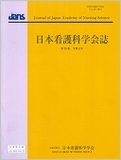Japanese
English
- 販売していません
- Abstract 文献概要
- 参考文献 Reference
要旨
目的:医療者のCultural Sensitivityの概念を明らかにし,日本における本概念の適用可能性を検討する ことである.
方法:Rodgersの概念分析アプローチの方法を用いた.2017年までに発行された英語文献44件,和文献4件の合計48件を分析対象とした.
結果:【対象者を理解したいという積極的な思い】,【自文化との差異の自覚】,【文化に関する知識】,【文化の理解】,【文化の尊重】の5つの属性と,4つの先行要件,6つの医療者・対象者の帰結を抽出した.
結論:本概念を,文化が異なる対象者を理解したいという積極的な思いのもと,自文化との差異を自覚し,文化に関する知識を得ることで対象者とその文化を理解し,尊重の態度で文化的差異に向き合う情動的・認知的能力であると定義した.グローバル化が加速している我が国において,本概念は異文化を有する対象者の理解を高める医療者の教育・評価に有用な概念であると考えられた.
Objectives: This study aims to determine the concept of “cultural sensitivity in healthcare professionals” and examine the applicability of this concept in Japan.
Methods: Rodgers' approach was used for concept analysis. A total of 48 articles of literature (44 in English, 4 in Japanese) published by 2017 were included in the analysis.
Results: Five attributes ([Willingness to actively understand the people], [Awareness of differences from own culture], [Knowledge of culture], [Cultural understanding], and [Respect of culture]) and four antecedents, and six consequences including those of healthcare professionals and people were extracted.
Conclusions: The concept of “cultural sensitivity in healthcare professionals” was defined as emotional and cognitive ability to face cultural differences with attitude of respect, based on willingness to actively understand the people by being aware of differences from the culture of healthcare professional's country and obtaining knowledge of the culture to understand the people and the culture of the people's country. In Japan, where globalization is accelerating, this concept is considered useful for developing an educational program and evaluation of healthcare professionals.
Copyright © 2019, Japan Academy of Nursing Science. All rights reserved.


